The first-ever labor affairs consultation meeting between Taiwan and the EU last week represents a milestone in bilateral cooperation, Deputy Minister of Labor Lin San-quei (林三貴) said yesterday.
Lin, who led the Taiwanese delegation to the meeting in Brussels on Thursday last week, said that the nation and the bloc have had good exchanges on a wide range of labor affairs-related topics through existing channels, while top EU labor affairs officials have visited Taiwan several times.
“This year, the first-ever labor affairs consultation meeting represented the beginning of a regular exchange mechanism to facilitate future cooperation between the two sides,” Lin said.

Photo: CNA, courtesy of the Ministry of Labor
Lin first talked with European Commission Deputy Director-General for Employment, Social Affairs and Inclusion Adriana Sukova for almost one hour.
Lin said Sukova paid close attention to Taiwan’s experience in executing labor policies and their success, and expressed hope that at the next meeting they would discuss Taiwanese policies to boost the rights of immigrant workers and fishery workers.
After the talks between Lin and Sukova, the meeting focused on how the European Globalization Adaptation Fund has helped workers deal with a fast-changing labor market and how the European Social Fund has helped disadvantaged workers land jobs, Lin said.
The delegation also shared Taiwan’s knowledge of the wider labor market in Asia, having invested in China and Southeast Asian nations for many years, Lin added.
The two sides also discussed youth unemployment and the impact of economic globalization and digitalization on workers, as well as cross-border social security and employment services for workers, he said.
“The consultation meeting gave EU officials a better understanding as to the value of such a view-exchange mechanism with Taiwan,” Lin said.
While pushing for further cooperation with the EU, Lin said he hoped the second consultation meeting in Taipei next year would proceed just as smoothly.
Lin also met Laszlo Andor, a former commissioner for employment, social affairs and inclusion, and Fons Leroy, managing director of the Vlaamse Dienst voor Arbeidsbemiddeling en Beroepsopleiding (the Flemish public employment service), to exchange views and ideas.

US President Donald Trump yesterday announced sweeping "reciprocal tariffs" on US trading partners, including a 32 percent tax on goods from Taiwan that is set to take effect on Wednesday. At a Rose Garden event, Trump declared a 10 percent baseline tax on imports from all countries, with the White House saying it would take effect on Saturday. Countries with larger trade surpluses with the US would face higher duties beginning on Wednesday, including Taiwan (32 percent), China (34 percent), Japan (24 percent), South Korea (25 percent), Vietnam (46 percent) and Thailand (36 percent). Canada and Mexico, the two largest US trading

ACTION PLAN: Taiwan would expand procurement from the US and encourage more companies to invest in the US to deepen bilateral cooperation, Lai said The government would not impose reciprocal tariffs in retaliation against US levies, President William Lai (賴清德) said yesterday, as he announced five strategies to address the issue, including pledging to increase Taiwanese companies’ investments in the US. Lai has in the past few days met with administrative and national security officials, as well as representatives from various industries, to explore countermeasures after US President Donald Trump on Wednesday last week announced a 32 percent duty on Taiwanese imports. In a video released yesterday evening, Lai said that Taiwan would not retaliate against the US with higher tariffs and Taiwanese companies’ commitments to

‘SPECIAL CHANNEL’: Taipei’s most important tasks are to stabilize industries affected by Trump’s trade tariffs and keep negotiations with Washington open, a source said National Security Council Secretary-General Joseph Wu (吳釗燮) arrived in the US for talks with US President Donald Trump’s administration, a source familiar with the matter said on Friday. Wu was leading a delegation for a meeting known as the “special channel,” the Financial Times reported earlier. It marked Trump’s first use of the channel since returning to the White House on Jan. 20. Citing a source familiar with the matter, the Financial Times reported that Minister of Foreign Affairs Lin Chia-lung (林佳龍) was also a part of the delegation. The visit came days after China concluded war games around Taiwan and amid Trump’s

CHIP EXCEPTION: An official said that an exception for Taiwanese semiconductors would have a limited effect, as most are packaged in third nations before being sold The Executive Yuan yesterday decried US President Donald Trump’s 32 percent tariff on Taiwanese goods announced hours earlier as “unfair,” saying it would lodge a representation with Washington. The Cabinet in a statement described the pledged US tariffs, expected to take effect on Wednesday next week, as “deeply unreasonable” and “highly regrettable.” Cabinet spokeswoman Michelle Lee (李慧芝) said that the government would “lodge a solemn representation” with the US Trade Representative and continue negotiating with Washington to “ensure the interests of our nation and industries.” Trump at a news conference in Washington on Wednesday announced a 10 percent baseline tariff on most goods